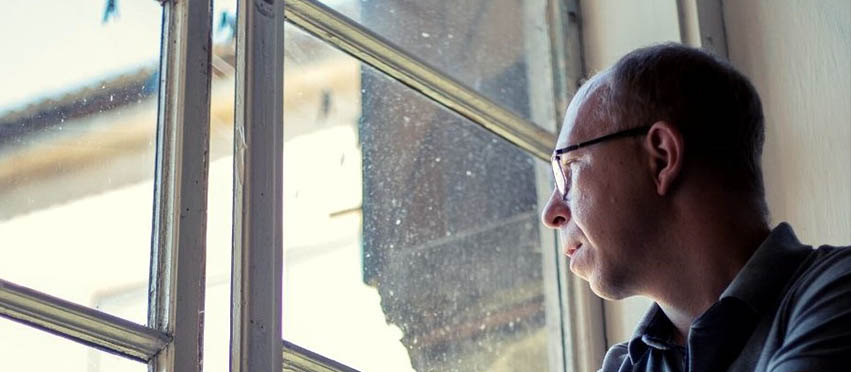Oleksii Chupa: “What’s behind this door?”

I am still plagued by the thought: What did Agnon feel after returning home?
I am trying to imagine this in more detail: How an incredulous expression appears on his face when the train is pulling up to Buchach; one can hardly recognize one’s hometown after nearly a quarter-century of separation, all the more so if it had experienced war. Here he is, after breaking out of the bustle at the train station. He makes his way downtown on foot, trying to capture en route the familiar smells and sounds of his childhood. Although Agnon emphasizes that the familiar aroma of millet porridge with honey has not gone away, I attribute this passage to artistic devices and allow myself not to believe this. What old sounds and smells can there be if the city had gone through war? Everything has been practically obliterated by fires and fear. Leaving his things at the hotel, he goes to the house where he grew up, and he doesn’t recognize anything. This is no surprise, after all. Living, mortal people have far fewer chances to survive a war than in our cities.
This is a watershed moment; after it comes the ultimate understanding that the world of childhood no longer exists, and along with this comprehension comes…no, I don't know what's behind the door yet.
But I would give a lot to find out what he was feeling.
One of the most widespread and most dangerous mistakes in attitudes to war is to believe that everything can be as it was before, that if you wait patiently, the moment will come when it will be possible to forget about the good, old neighbors, who overnight are transformed into predators that are concerned only with their own survival; about the pogroms and looting, about the sieges and mass disinformation during the preparations for military operations. It’s like a switch clicking in your head, and everything will be swept away. We will rebuild and forget. And this will never be repeated.
From this standpoint, Agnon’s A Guest for the Night is a terribly interesting work, especially if you consider the chronology. The novel is based on the writer’s memories of his visit to his native Buchach in 1930. The [First] world war, over the course of which the city was horribly destroyed, had ended twelve years earlier. Invalids had resigned themselves to their injuries. Families had reconciled themselves to those who had been killed and disappeared without a trace, even though they continue to talk about them, in order to fill the void in themselves at least with words. Everyone reverted a long time ago to a supposedly normal life, albeit one that was beggarly and miserable from the weight of what they had experienced. Nevertheless, the humble expectation that God will recompense for the years of deprivation with a return to former peace and quiet is felt in every dialogue.
However, the novel itself was written and published in the late 1930s, and this places the emphasis quite differently. We see a world that still holds out hope for peace, waking every morning from the increasingly louder saber rattling. We see a world of people who are so imbued with their horrible memories that sometimes it seems as though they have been reduced to an absolute and they simply don’t believe that things can get any worse. We see the Old World only a minute before it was swept from the face of the earth by the Catastrophe.
The lesson is simple: War is a dove tamed by humanity, and it will always return. Woe to those who hearken to the white noise of their own grief, behind which the fluttering of doves’ wings is not heard. Of course, our native cities—like parents—will be punished once again in our stead for the stupidities that we have done. The main thing is that we finally begin to listen closely. But that’s hardly to be expected.
And once again I imagine the writer approaching his old home. He stands for a long time, not daring to raise his eyes to the windows of his former abode. With a nod of the head he greets people whom he does not recognize; and seeing the world in which he had grown up destroyed, for the first time in his life, he doubts his own existence.
Оleksii Chupa is a poet and prose writer. The author of the collections Ukraїns′ko-rosiis′kyi slovnyk (Ukrainian-Russian Dictionary (2011), 69 (2011), Koma (The Comma, 2015), as well as the prose works 10 sliv pro Vitchyznu (10 Words about the Motherland, 2014), Bomzhi Donbasu (Bums of the Donbas, (2014), Kazky moho bomboskhovyshcha (Tales of My Bomb Shelter, (2014), Akvarium (Aquarium, 2015), Vyshnia і ia (The Cherry Tree and I, 2016). Fellow of the Gaude Polonia Program of the Ministry of Culture of the Republic of Poland (2015), and a finalist of the 2015 Conrad Award.
This essay was written during the author’s literary residency in Buchach, with the support of the Canadian philanthropic fund Ukrainian Jewish Encounter.
Originally appeared in Ukrainian @Litcentr.ua
Translated from the Ukrainian by Marta D. Olynyk.
Edited by Peter Bejger.



















